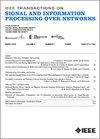异构多智能体系统基于序列的群体一致性
IF 3
3区 计算机科学
Q2 ENGINEERING, ELECTRICAL & ELECTRONIC
IEEE Transactions on Signal and Information Processing over Networks
Pub Date : 2025-09-11
DOI:10.1109/TSIPN.2025.3608945
引用次数: 0
摘要
本文研究了一种特殊的多智能体群体共识控制问题——限制序列同步(RSS)群体共识,即所有子群体按照限制的群体共识序列达成各自的共识,而每个子群体中的智能体同时达成共识。为了更全面地表达这个问题,我们首先引入RSS稳定性,其中对于单个系统,其所有状态分量都遵循受限序列到达稳定状态。接下来,将最初应用于单个系统的RSS稳定性概念扩展到多智能体系统的RSS群体共识。在此基础上,设计了一种滑模控制协议,以实现异构多智能体系统的RSS群一致性,并处理执行器故障和外部干扰的实际影响。在RSS组共识控制器中引入自适应技术来动态处理执行器故障。两个仿真实例验证了所开发的RSS组共识控制协议的有效性。本文章由计算机程序翻译,如有差异,请以英文原文为准。
Sequence-Based Group Consensus for Heterogeneous Multi-Agent Systems
This article investigates a special multi-agent group consensus control problem—the restricted-sequence-synchronized (RSS) group consensus, where all subgroups achieve their respective consensus according to a restricted group consensus sequence, while agents within each subgroup simultaneously reach consensus. To comprehensively express this problem, we first introduce RSS stability, where for a single system, all of its state components arrive at the stable state following a restricted sequence. Next, the concept of RSS stability, initially applied to a single system, is extended to the RSS group consensus of multi-agent systems. Furthermore, a sliding-mode control protocol is devised to achieve RSS group consensus in heterogeneous multi-agent systems and handle the practical impact of actuator faults and external disturbance. Adaptive techniques are incorporated within this RSS group consensus controller to dynamically address the actuator faults. Two simulation cases illustrate the effective performance of the developed RSS group consensus control protocol.
求助全文
通过发布文献求助,成功后即可免费获取论文全文。
去求助
来源期刊

IEEE Transactions on Signal and Information Processing over Networks
Computer Science-Computer Networks and Communications
CiteScore
5.80
自引率
12.50%
发文量
56
期刊介绍:
The IEEE Transactions on Signal and Information Processing over Networks publishes high-quality papers that extend the classical notions of processing of signals defined over vector spaces (e.g. time and space) to processing of signals and information (data) defined over networks, potentially dynamically varying. In signal processing over networks, the topology of the network may define structural relationships in the data, or may constrain processing of the data. Topics include distributed algorithms for filtering, detection, estimation, adaptation and learning, model selection, data fusion, and diffusion or evolution of information over such networks, and applications of distributed signal processing.
 求助内容:
求助内容: 应助结果提醒方式:
应助结果提醒方式:


